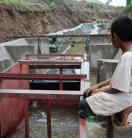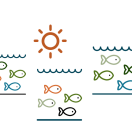Lao fishers embrace Australian technology
An Australian technology embraced by a Lao community to support better fisheries and healthy waterways has been officially handed over to their custodianship.
At a ceremony in the rural town of Pak Peung, a fish pass— which is a “water ladder” constructed around obstacles such as dams to allow fish to travel up and down waterways unrestricted—was given to community leaders by Australian Ambassador to Lao PDR Mr Paul Kelly.
‘The fish pass at Pak Peung was built in 2005 with the support of ACIAR. It was the first one ever established in Laos and co-managed from the start with the local community,’ said Mr Kelly.
‘Our Lao colleagues involved in the project are now regional leaders on fish pass technology thanks to what has been learned at the site. We are very happy to see full management now sit with them.’
Laos now boasts 14 completed fish pass structures and another 26 are planned with support from development banks.
ACIAR Fisheries Research Program Manager Professor Ann Fleming said the fish passes have improved Mekong’s wetland ecosystems, which are vital nursery habitats for many migratory fish species.
‘Communities, including Pak Peung, where fish passes have been constructed, are seeing an increase in the number and diversity of fish species, and so they have increased people’s access to fish,’ said Prof Fleming.
Dr Chay Bounphanousay, Director General of the Lao National Agriculture and Forestry Research Institute, credits fish passes with supporting better nutrition and food security for rural Lao communities.
‘Fish are an important part of the diets of Lao people,’ said Dr Bounphanousay.
‘Before the project, freshwater fish were in decline because the fish couldn’t freely move around rivers to reproduce and feed. This meant people had less fish to eat and their health suffered.
‘Construction of the fish pass has seen this trend reverse.’
Professor Lee Baumgartner, Fish Ecologist from Charles Sturt University, has been leading the fish pass project in Laos.
‘At Pak Peung, one valuable group of fish—catfishes—are using the fish pass. Locals hadn’t seen catfish in 20 years but now they are reporting catching and selling them, this is generating important additional household income,’ said Prof Baumgartner.
‘The fish pass ensures more fish for Pak Peung village and for the six nearby villages that rely on the fish using the structure to swim upstream and into the wetlands that are fished for food.’
He added that integrating fish passes into planned infrastructure upgrades across Laos will help prevent future ecological disasters across the Lower Mekong Basin.
The National University of Laos has been a partner on the project. Its president, Dr Oudom Phonekhampheng, has been involved since 2005. He reinforced the importance of working with local partners and the community to construct the fish passes and research their effectiveness.
He added, ‘The community is now playing a key role in improving the health of their local fisheries and developing sustainable opportunities to ensure the availability of fish to harvest.’
Local representative and community leader Mr Thavone Phommavong has also been involved with the project from the start. He said that since the fish pass was built there are more fish, which is better for the villagers.
In addition to building infrastructure, the project has also developed knowledge and skills among researchers including providing six scholarships for researchers from Laos, Indonesia and Myanmar.
The project, Quantifying biophysical and community impacts of improved fish passage in Lao PDR and Myanmar, will conclude later this year.




